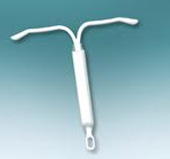- Recognizing the Signs of Hypothyroidism
- 10 Strategies to Overcome Insomnia
- Could Artificial Sweeteners Be Aging the Brain Faster?
- Techniques for Soothing Your Nervous System
- Does the Water in Your House Smell Funny? Here’s Why
- Can a Daily Dose of Apple Cider Vinegar Actually Aid Weight Loss?
- 6 Health Beverages That Can Actually Spike Your Blood Sugar
- Treatment Options for Social Anxiety Disorder
- Understanding the Connection Between Anxiety and Depression
- How Daily Prunes Can Influence Cholesterol and Inflammation
IUD Won’t Hurt Future Fertility, Study Contends


WEDNESDAY, Oct. 16Intrauterine devices, commonly known as IUDs, do not impair women’s future fertility, according to a new study.
Researchers in Guangdong, China found that once these contraceptive devices are removed, women have relatively high pregnancy rates and normal pregnancy results.
The study’s findings were scheduled for presentation Wednesday in Boston at a meeting of the International Federation of Fertility Societies and the American Society for Reproductive Medicine.
“Being able to exercise some control over when they reproduce is a great emancipator for women,” Richard Kennedy, Secretary General of the International Federation of Fertility Societies, said in a meeting news release. “The fact that IUD use has no long-lasting effect on subsequent ability to conceive is reassuring news.”
In conducting the study, the researchers surveyed 562 women who had an IUD removed between 2012 and 2013 because they wanted to have a child.
The researchers found that about three-quarters of the women were able to conceive a child after their IUD was removed. Although the women’s age and how long they used an IUD played a role, on average it took 11 months to get pregnant.
Most of the IUDs used were copper, and pregnancy rates after IUD removal for the copper IUDs was about 78 percent. Pregnancy rates were about 74 percent for women who used IUDs that contained the emergency contraceptive levonorgestrel. The researchers said this difference was statistically insignificant.
The study also showed the rate of pelvic inflammatory disease was about 11 percent. Although 12 women experienced ectopic pregnancies, there was no increase in pregnancy complications or negative results, the researchers said.
The IUD is a small, T-shaped device inserted into the uterus.
The stigma associated with IUDs is related to the Dalkon Shield, made by the millions in the 1970s and later linked to infections, including pelvic inflammatory disease, miscarriage, ectopic pregnancy and some deaths. The Dalkon Shield, which had a design flaw that carried bacteria into the uterus, is no longer on the market.
Data and conclusions presented at medical meetings are typically considered preliminary until published in a peer-reviewed medical journal.
More information
The U.S. Centers for Disease Control and Prevention provides more information on IUDs and other forms of contraception.
Source: HealthDay
Copyright © 2026 HealthDay. All rights reserved.










